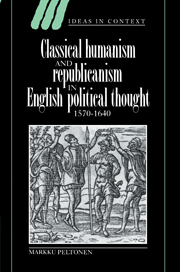Book contents
- Frontmatter
- Contents
- Note on text
- Acknowledgements
- List of Abbreviations
- Introduction: classical humanism and republicanism in England before the Civil War
- 1 Classical humanism restated
- 2 Classical republicanism in the margins of Elizabethan politics
- 3 Civic life and the mixed constitution in Jacobean political thought
- 4 Francis Bacon, Thomas Hedley and the true greatness of Britain
- 5 Thomas Scott: virtue, liberty and the ‘mixed Governement’
- 6 The continuity of the humanist tradition in early Caroline England
- Epilogue
- Bibliography
- Index
- IDEAS IN CONTEXT
- Frontmatter
- Contents
- Note on text
- Acknowledgements
- List of Abbreviations
- Introduction: classical humanism and republicanism in England before the Civil War
- 1 Classical humanism restated
- 2 Classical republicanism in the margins of Elizabethan politics
- 3 Civic life and the mixed constitution in Jacobean political thought
- 4 Francis Bacon, Thomas Hedley and the true greatness of Britain
- 5 Thomas Scott: virtue, liberty and the ‘mixed Governement’
- 6 The continuity of the humanist tradition in early Caroline England
- Epilogue
- Bibliography
- Index
- IDEAS IN CONTEXT
Summary
Sixty years separated the treatises of Roger Baynes, John Barston and John Foord from Richard Brathwait's A survey of history. It would be wrong to deny the numerous differences between them, but it would be equally misleading to dispute their striking similarities. There is little doubt that humanism as political parlance was not completely overshadowed by other vocabularies in the mid sixteenth century. On the contrary, its central convictions were forcefully rehearsed throughout the late sixteenth and early seventeenth centuries. The English showed complete familiarity with such deeply entrenched notions of the humanist tradition as the virtuous civic life and vera nobilitas. These notions enabled them to portray themselves as citizens and to characterize their life as one of participation rather than subjection. From Thomas Rogers to Richard Brathwait it was argued that, before everything else, a virtuous negotium made an Englishman capable of acting as a magistrate of his local community or of the community of the whole realm and of performing his duty in public assemblies whether local or national in composition. And to lead such a life guaranteed the well-being of the whole commonwealth.
As well as subscribing to the notions of the vita activa and vera nobilitas in their attempt to conceive of themselves as active citizens, early modern Englishmen many a time resorted to more openly republican themes. Ancient and contemporary republics not merely aroused curiosity and captured attention; they also commanded sincere admiration. This is not to say that those who expressed their admiration were republicans. Nevertheless, as we have seen, Englishmen were perfectly capable of employing at least three central characteristics of classical republicanism.
- Type
- Chapter
- Information
- Publisher: Cambridge University PressPrint publication year: 1995



